I recently read the following in J. Denny Weaver’s book, The Nonviolent God (p. 220):
When the hour arrived for the end of Word War I, Winston Churchhill and his wife went to Downing Street to congratulate Lloyd George, the prime minister. Churchill interrupted a meeting already in progress and suggested that since the “fallen foe” was close to starvation, they should send “a dozen great ships crammed with provisions” to Hamburg. The suggestion received a cold rebuff.
Six years later a German soldier described his feelings at the time and wrote that “only fools, liars, and criminals could hope for mercy from the enemy.” His hatred grew for those responsible for the suffering. On observing the great misery [in Germany], he wrote, “My own fate became known to me … I resolved to go into politics.”
That soldier was Adolph Hitler.
 Critics of nonviolence often use Adolph Hitler as an example of a time when violence and bloodshed was absolutely necessary. They say, “So if you had a chance to go back in time and kill Hitler and save millions of innocent Jews, you wouldn’t do it?”
Critics of nonviolence often use Adolph Hitler as an example of a time when violence and bloodshed was absolutely necessary. They say, “So if you had a chance to go back in time and kill Hitler and save millions of innocent Jews, you wouldn’t do it?”
What the question fails to recognize is that there were good ways of stopping Hitler that did not involve killing him. One wonders if there ever would have been a Nazi Germany and a World War II if Winston Churchill’s advice had been heeded.
Similarly, one wonders if Winston Churchill’s suggestion could help the West in our struggle with radical Islam and ISIS.
Recent estimates put the cost of the recent wars in Iraq and Afghanistan at somewhere between $4 and $6 Trillion.
If that isn’t appalling enough, in our efforts to retaliate against the horrible tragedy of the murder of 2,753 people in the Word Trade Center on 9/11/2001, we sent our young men and women overseas, and so far, 4,486 U.S. soldiers have died in Iraq and 2,345 U.S. soldiers have died in Afghanistan, with tens of thousands of soldiers being injured or wounded. And this is nothing compared to the casualties among the people of Iraq and Afghanistan.
Looking back, is it possible that there might be a better way to defeat Isis and radical Islamic terrorists … a way that would have spent less money and fewer (if any) lives? What would Iraq and Afghanistan look like today if we had followed Churchill’s advice in the wake of World War I, and had sent boatloads of food and construction crews to the Middle East to prop up their economy and give their people an education?
The annual GDP of Iraq is just over $200 Billion. Afghanistan is about $60 billion. Imagine what the two countries might look like today if we had spent $4 Trillion building those nations up instead of bombing them down?
 When it comes to stopping Islamic terrorists, I sometimes think a Wal-Mart in Baghdad would work better than bombs.
When it comes to stopping Islamic terrorists, I sometimes think a Wal-Mart in Baghdad would work better than bombs.
“Oh … But you can’t export capitalism into the Middle East! They will rise up in rebellion.”
Maybe. But if your choices are between a Wal-Mart and bombs, are you really going to choose bombs?
I am not saying this would have “worked,” … but then, is what we are doing now really “working”?
I am not a politician, and I know these are difficult issues, but I just sometimes wonder when the world is going to wake up and realize the truth that that violence always and only leads to more violence. In trying to defeat violence with violence you become like the enemy you seek to defeat.




 Have you ever wondered why God doesn’t make Himself more obvious?
Have you ever wondered why God doesn’t make Himself more obvious? He and I were talking next to our wood pile (we heated our home with fire wood) and there was a two by four sitting right on top … it was about four feet long … perfect for knocking someone over the head. He pointed to it and said, “See that two by four, God? Come on! Hit me over the head with it! Right now! If you exist and if you love you me, knock me out!”
He and I were talking next to our wood pile (we heated our home with fire wood) and there was a two by four sitting right on top … it was about four feet long … perfect for knocking someone over the head. He pointed to it and said, “See that two by four, God? Come on! Hit me over the head with it! Right now! If you exist and if you love you me, knock me out!” God hides Himself because God loves and respects us so much.
God hides Himself because God loves and respects us so much. Because He loves us.
Because He loves us.
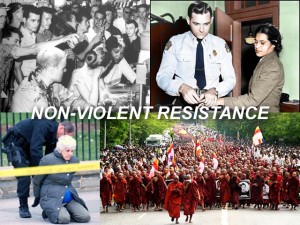 I recently had an email exchange with a reader of this blog about pacifism and nonviolence. Usually such exchanges are better suited for the comment section of blog posts, since this allows more people to weigh in on the conversation. So, for the sake of inviting you in to the conversation, I will post our email exchange below. Please read it and then weigh in with your own thoughts.
I recently had an email exchange with a reader of this blog about pacifism and nonviolence. Usually such exchanges are better suited for the comment section of blog posts, since this allows more people to weigh in on the conversation. So, for the sake of inviting you in to the conversation, I will post our email exchange below. Please read it and then weigh in with your own thoughts. [Note that nonviolent resistance is not about “winning” or “defeating the enemy.” If we nonviolently resist, we may end up dead. That’s what happened to Jesus, after all. The goal of nonviolent resistance is not to “stay alive” while taking the life of someone else (if necessary), but it is rather to reveal God and love others like Jesus. It is impossible to do this if you are killing them.]
[Note that nonviolent resistance is not about “winning” or “defeating the enemy.” If we nonviolently resist, we may end up dead. That’s what happened to Jesus, after all. The goal of nonviolent resistance is not to “stay alive” while taking the life of someone else (if necessary), but it is rather to reveal God and love others like Jesus. It is impossible to do this if you are killing them.] The Bible does not promote pacifism, but does promote nonviolent resistance. We are to do what we can to stop evil and fight against evil, but we must not do so with the weapons of war and violence. Among many other texts, one primary place Jesus teaches this is in His instruction to
The Bible does not promote pacifism, but does promote nonviolent resistance. We are to do what we can to stop evil and fight against evil, but we must not do so with the weapons of war and violence. Among many other texts, one primary place Jesus teaches this is in His instruction to 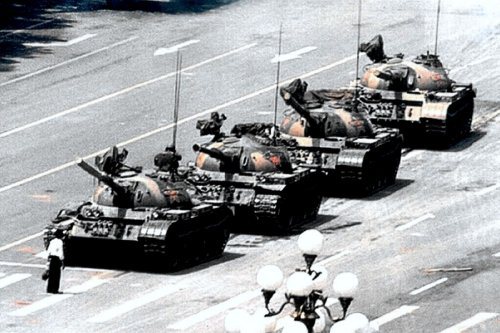
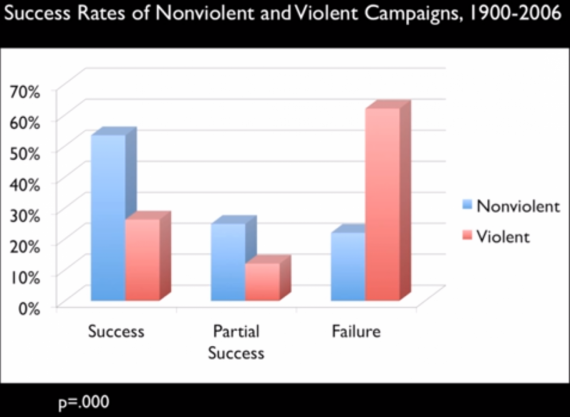
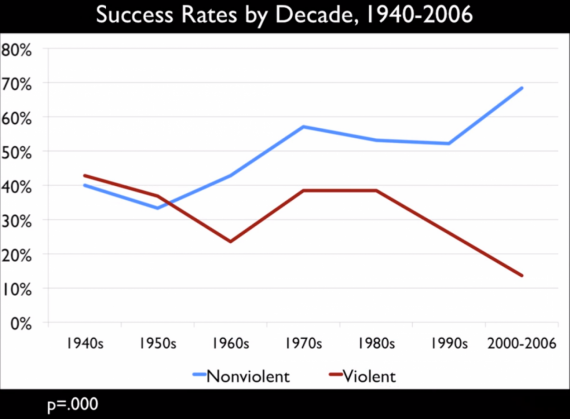

 It is common in Christian circles to hear admonitions to “Love the Sinner; hate the sin.”
It is common in Christian circles to hear admonitions to “Love the Sinner; hate the sin.” 
 The simple fact that we label the person we are talking about as a “sinner” indicates that we do not have love for them in the first place.
The simple fact that we label the person we are talking about as a “sinner” indicates that we do not have love for them in the first place.  When a watching world says Christians are full of hate, it is not a good strategy to tell them that we don’t hate them we just hate their sin.
When a watching world says Christians are full of hate, it is not a good strategy to tell them that we don’t hate them we just hate their sin. 

 When we say, “Love the sinner; hate the sin,” what we are really saying is “I will love only those I want to love, and I will hate and despise and cast out those people who do things I have decided are worse than the things I myself do, and this way I can make myself feel better while I condemn them for all the problems that I myself have contributed to but don’t want to admit.”
When we say, “Love the sinner; hate the sin,” what we are really saying is “I will love only those I want to love, and I will hate and despise and cast out those people who do things I have decided are worse than the things I myself do, and this way I can make myself feel better while I condemn them for all the problems that I myself have contributed to but don’t want to admit.”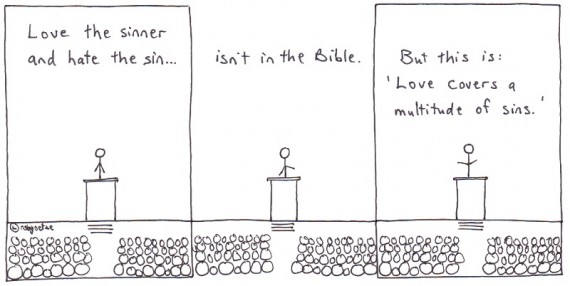
 And why can’t that be enough? When we see someone else behaving in ways we don’t approve of and which we think is sin (and as long as it’s not illegal or harming someone), why can’t “love” be the only word that comes to our mind?
And why can’t that be enough? When we see someone else behaving in ways we don’t approve of and which we think is sin (and as long as it’s not illegal or harming someone), why can’t “love” be the only word that comes to our mind? 

 It is true that everything we need to know in life we learned in Kindergarten, and one of the main things we learned in Kindergarten was the importance of saying we’re sorry to others when we hurt them.
It is true that everything we need to know in life we learned in Kindergarten, and one of the main things we learned in Kindergarten was the importance of saying we’re sorry to others when we hurt them. 